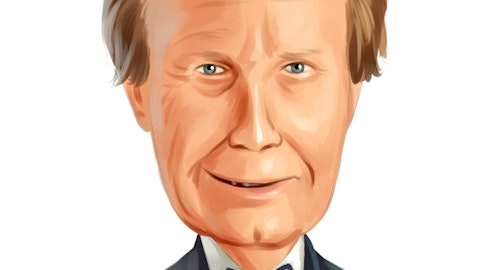Mark Harris: Let me see if I can try and answer that, Tobey. I think what you’re currently seeing, look, in terms of Executive Search and our EBITDA margins on that side of the business, I think you have it and it’s obviously a very scaled business, and that’s always going to kind of remain in that mid-20s context. I think if you’re asking me long term, I’ll answer it both ways, long-term and short-term. I think long-term On-Demand Talent, as we discussed is an 8% to 12% margin business, depending on the weighting between the U.S. and Europe and how those kind of forces play out. I think in terms of Heidrick Consulting, as we’ve talked about, we’re at that near breakeven point. And again, as we get scale into the business, it should be at 10% to 12%, maybe a little bit higher, if we can get scale into that business and that’s where we expect to come out.
And then I think on the digital side, once it kind of grows, scales, we get the amortization kind of covered off, and moving ourselves past that point, we’d be in the, what I’ll call, the low 30s in terms of what that margin on a SaaS because we have the upfront fees and everything else that really — we don’t try to get a lot of margin on. We’re trying to get them up and that’s the benefits on the back of that. So that’s where we would expect us to be. I think the overall EBITDA margins long-term for our business are still probably mid-teens because you’ve got a couple of those that would go way too down from what we have in Executive Search, and then you’ve got the digital side that will go way too up from Executive Search. So long-term vision, that’s what we’re trying to see.
I think your next question, which is embedded, is when are we going to get there? My honest assessment is I think on the On-Demand Talent side, it’s still very much in two different forces. One, getting the sales force correlated correctly, which is really the whole retransition of what we’re trying to do, and the second element is looking at the technology side of it and really putting an investment into that because I think that’s going to pay dividends down the road in terms of our ability to scale that and really try to help the margins kind of release themselves. And then Heidrick Consulting, I think it’s there. As we’ve talked about a million times, it’s really all about scale. And again, I think that’s going to be a 10% to 12%, hopefully, revenue growth long-term business, and then you can figure out really in terms of how we get to $150 million to $200 million of revenue, what it’s going to take to get there outside of inorganic.
And of course, inorganic can accelerate us, but it’s about the best line of sight I can give you. I don’t know if that helps you a bunch.
Tobey Sommer: Sure. I appreciate that perspective and that color. With respect to the Executive Search business, particularly in the North American geography, could you speak to the degree to which being a resident in the city where a company is headquartered is required at this point? I’m sure there’s been a decent amount of ebb and flow in recent years as a result of the pandemic, but I kind of wanted to get a snapshot of where that is currently, if there are any implications of that for the business, in demand and sort of the aperture that you can do your recruiting. And do you have an expectation for a trend along those lines going out in the future?
Krishnan Rajagopalan: Yes. And is your question on the candidate side or on the Heidrick side of where our offerings are?
Tobey Sommer: On the candidate and customer employer side, not specifically your internal preferences, but more market related.
Krishnan Rajagopalan: Sure. Yes. Look, we’re seeing a lot more flexibility on that in terms of recruitment and the ability to look across, particularly the U.S. for talent. I think many leadership roles have changed from 5 days a week to expecting somebody to be in the office 2 to 3 days a week, so there’s that movement which supports that. So we’re definitely looking more across the U.S. Having said that, people want people to have a home office and want people to commit, particularly on our leadership jobs, to be resident in that home office as well. So that requirement is still there but with flexibility more than ever before.
Tobey Sommer: And have you felt a change in any demand or customer conversations as a result of the emerging Middle East conflict? I’m sure it’s not necessarily a large exposure for the firm geographically. But where you are present, could you speak to what the last 3 weeks have sort of looked like for your business?
Krishnan Rajagopalan: Yes. I mean look, we have a small team in Israel and there are projects there that are clearly people evaluating and getting delayed, but that’s a small bit of work. In the rest of the world, we haven’t seen an impact yet. In the last couple of weeks, we’ve got our eye on that, we’re talking to the teams, and we haven’t seen anything yet.
Tobey Sommer: Thank you very much.
Operator: Thank you. We’ll go next to now to Marc Riddick at Sidoti.
Marc Riddick: Hi. Good evening. A lot of my questions have been answered. I was just sort of curious if you could maybe elaborate a little bit more on some of the AI-driven opportunities in your prepared remarks that you talked a bit about. And maybe you could share a little bit about maybe how you feel as though you’re positioned from a talent standpoint to begin to work on those opportunities and how they may evolve going forward.
Krishnan Rajagopalan: Sure. Yes. So look, we’ve got AI, as we think about it, in three buckets. The first bucket, obviously, is a service offering that we offer to clients on helping them with their AI needs. And in that conversation, we have tons of conversations in project work that’s emerging as a result of that. So that’s the first bucket. The second bucket is basically into our tools that we use with clients and others and being able to leverage AI for that. We already do that. I mean, so for example, on the digital side with Heidrick Navigator, AI is a component to that, which is why we partnered with Eightfold AI. And we’re looking at a whole host of other things that we are piloting now inside the firm to figure out how does it impact matching, how does it impact a whole host of other things.




